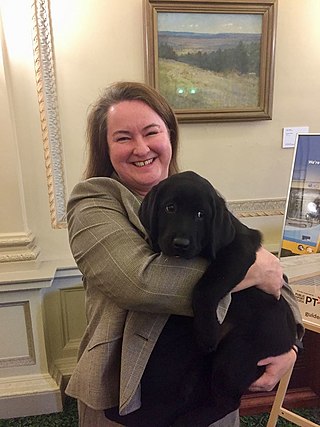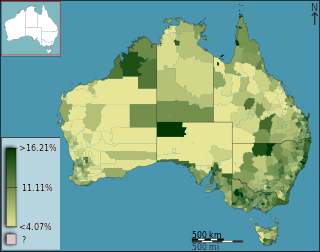Medicare is the publicly funded universal health care insurance scheme in Australia, along with the Pharmaceutical Benefits Scheme (PBS) operated by the nation's social security department, Services Australia. Medicare is the principal way Australian citizens and permanent residents access most health care services in Australia. The scheme either partially or fully covers the cost of most primary health care services in the public and private health care system. All Australian citizens and permanent residents have access to fully-covered health care in public hospitals, funded by Medicare, as well as state and federal contributions. International visitors from 11 countries have subsidised access to medically necessary treatment under reciprocal agreements.

Jennifer Louise Macklin is an Australian former politician. She was elected to federal parliament at the 1996 federal election and served as the deputy leader of the Australian Labor Party (ALP) from 2001 to 2006, under opposition leaders Simon Crean, Mark Latham and Kim Beazley. After the ALP won government at the 2007 election, she held ministerial office under Kevin Rudd and Julia Gillard, serving as Minister for Families, Community Services and Indigenous Affairs (2007–2013) and Minister for Disability Reform (2011–2013). She retired from parliament at the 2019 election.

The California Public Utilities Commission is a regulatory agency that regulates privately owned public utilities in the state of California, including electric power, telecommunications, natural gas and water companies. In addition, the CPUC regulates common carriers, including household goods movers, limousines, rideshare services, self-driving cars, and rail crossing safety. The CPUC has headquarters in the Civic Center district of San Francisco, and field offices in Los Angeles and Sacramento.

Mary Louise Newling Wooldridge is a former Australian politician. She was a Liberal Party member of the Parliament of Victoria from 2006 to 2019. She was a member of the Victorian Legislative Assembly, representing the seat of Doncaster from 2006 to 2014; her seat was abolished in a redistribution for that year's election, and she was subsequently elected to the Victorian Legislative Council for Eastern Metropolitan Region in November's state election.

Tertiary education in Australia is formal education beyond high school in Australia, consisting of both government and private institutions and divided into two sectors; Higher Education and Vocational Education and Training (VET) provided by government-owned TAFEs & private Registered Training Organisations (RTO). Australian Qualifications Framework (AQF), the Australian national education policy, classifies tertiary qualification into 10 levels: level 1 to 4 vocational certificates ; level 5 & 6 undergraduate diploma and advanced diploma; level 6 associate degree; level 7 bachelor degree, level 8 bachelor honours degree & graduate certificates and graduate diplomas; level 9 for master's degree; and level 10 PhD. Most universities are government owned and mostly self-regulated. For other institutes there are two national regulators for tertiary education for registration, recognition and quality assurance of both the "provider institutes" as well as the "individual courses" provided by the providers. Tertiary Education Quality and Standards Agency (TEQSA) regulates institutes which provide education from level 5 or above. Australian Skills Quality Authority (ASQA) regulates institutes which provide education from level 1 to level 6.

The Government of the Australian Capital Territory, also referred to as the Australian Capital Territory Government or ACT Government, is the executive branch of the Australian Capital Territory, one of the territories of Australia. The leader of the party or coalition with the confidence of the Australian Capital Territory Legislative Assembly forms government. Unlike the Australian States and the Northern Territory, the Australian Capital Territory Legislative Assembly directly elects one of their number to be the Chief Minister of the Australian Capital Territory as the head of the Government, rather than being appointed by a Governor or Administrator.

Health care in Australia operates under a shared public-private model underpinned by the Medicare system, the national single-payer funding model. State and territory governments operate public health facilities where eligible patients receive care free of charge. Primary health services, such as GP clinics, are privately owned in most situations, but attract Medicare rebates. Australian citizens, permanent residents, and some visitors and visa holders are eligible for health services under the Medicare system. Individuals are encouraged through tax surcharges to purchase health insurance to cover services offered in the private sector, and further fund health care.

Stuart Rowland Robert is an Australian former politician who served as Minister for Employment, Workforce, Skills, Small and Family Business from 2021 to 2022, following his appointment as Minister for Government Services and Minister for the National Disability Insurance Scheme in 2019. He was also appointed Acting Minister for Education and Youth in December 2021 and was the Member of Parliament (MP) for Fadden upon winning the seat at the 2007 federal election, until his resignation in May 2023.
Ombudsmen in Australia are independent agencies who assist when a dispute arises between individuals and industry bodies or government agencies. Government ombudsman services are free to the public, like many other ombudsman and dispute resolution services, and are a means of resolving disputes outside of the court systems. Australia has an ombudsman assigned for each state; as well as an ombudsman for the Commonwealth of Australia. As laws differ between states just one process, or policy, cannot be used across the Commonwealth. All government bodies are within the jurisdiction of the ombudsman.

TAD Australia is an Australian federation of state not-for-profit organisations which provide personalized equipment, technology, and services to disabled persons, including children.
The Tertiary Education Quality and Standards Agency (TEQSA) is Australia's independent national quality assurance and regulatory agency for higher education.

The National Disability Insurance Scheme (NDIS) is a scheme of the Australian Government that funds costs associated with disability. The scheme was legislated in 2013 and went into full operation in 2020. Its introduction followed the 15 month long 'Make It Real' campaign which involved community forums, visits to MPs, the holding of a National Disability and Carer Congress, 'Disabilitea' gatherings, and rallies involving 20,000 people. The scheme is administered by the National Disability Insurance Agency (NDIA) and overseen by the NDIS Quality and Safeguards Commission. Bill Shorten provides ministerial oversight as Minister for the National Disability Insurance Scheme.

Aged care in Australia, is the provision of services to meet the unique needs of older people in Australia. It includes both residential aged care as well as services provided in the home such as personal care, domestic assistance, home nursing, nutrition and meal preparation, respite services, continence management, mobility & dexterity assistance, transport, social support and the provision of equipment and aids.
Artificial intelligence (AI) has a range of uses in government. It can be used to further public policy objectives, as well as assist the public to interact with the government. According to the Harvard Business Review, "Applications of artificial intelligence to the public sector are broad and growing, with early experiments taking place around the world." Hila Mehr from the Ash Center for Democratic Governance and Innovation at Harvard University notes that AI in government is not new, with postal services using machine methods in the late 1990s to recognise handwriting on envelopes to automatically route letters. The use of AI in government comes with significant benefits, including efficiencies resulting in cost savings, and reducing the opportunities for corruption. However, it also carries risks.
The Royal Commission into Violence, Abuse, Neglect and Exploitation of People with Disability is a royal commission established on 4 April 2019 by the Australian government pursuant to the Royal Commissions Act 1902. The Honourable Ronald Sackville, who serves as Chair of the Royal Commission, The Honourable Roslyn Atkinson, Ms Barbara Bennett, Dr Rhonda Galbally, Ms Andrea Mason, Mr Alastair McEwin, and The Honourable John Ryan currently serve as Royal Commissioners.

Dementia and Alzheimer's disease in Australia is a major health issue. Alzheimer's disease is the most common type of dementia in Australia. Dementia is an ever-increasing challenge as the population ages and life expectancy increases. As a consequence, there is an expected increase in the number of people with dementia, posing countless challenges to carers and the health and aged care systems. In 2018, an estimated 376,000 people had dementia; this number is expected to increase to 550,000 by 2030 and triple to 900,000 by 2050. The dementia death rate is increasing, resulting in the shift from fourth to second leading cause of death from 2006 to 2015. It is expected to become the leading cause of death over the next number of years. In 2011, it was the fourth leading cause of disease burden and third leading cause of disability burden. This is expected to remain the same until at least 2020.

Alan Robertson is a former judge of the Federal Court of Australia. He served as a deputy president of the Administrative Appeals Tribunal, and retired from the Court in May 2020 having reached the mandatory retirement age for federal judicial appointments.
The Commonwealth Rehabilitation Service was an Australian Government body that provided rehabilitation and employment services to Australians with a disability from 1941 until 2015. At this time, the body was abolished and replaced with the more decentralised National Disability Insurance Scheme (NDIS) and Disability Employment Services (DES) networks.
National Insurance was a planned system of social security in Australia which would have provided medical, disability, unemployment and pension coverage to its contributors and their dependents. The scheme was passed into law by the Lyons government as the National Health and Pensions Insurance Act 1938, but was abandoned the following year in order to divert funds to defence.












